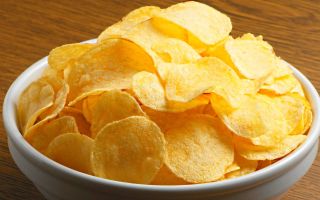Content
- 1 The history of the creation of potato chips
- 2 The chemical composition and calorie content of chips
- 3 Why are chips bad for your health?
- 4 The harm of chips for children
- 5 Can you eat chips during pregnancy and breastfeeding?
- 6 For whom are chips contraindicated?
- 7 Is there a benefit to chips?
- 8 How to make homemade chips?
- 9 Chips in the oven
- 10 Chips in the microwave
- 11 How to choose less harmful chips
- 12 Conclusion
Chips are thin slices of root vegetables that are fried in a large amount of oil. This snack is popular among young people, children and adults love it. The benefits and harms of chips are discussed by nutritionists and doctors who specialize in various fields of medicine.
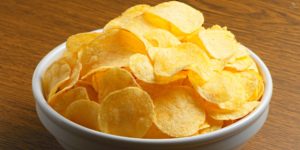
The history of the creation of potato chips
The emergence of chips was preceded by a story that took place in a restaurant in a New York state hotel in the 19th century. According to legend, the chef of the restaurant was George Crum. When the famous millionaire was having dinner at the restaurant, Krum was in high spirits. The king of America's railroad, Vanderbilt, returned two servings of potatoes to the kitchen with a comment about the too thick slices and the chef decided to teach the owner a lesson. He sliced the potatoes as thinly as the kitchen tools of the day allowed and fried them until crispy.
The millionaire liked the dish for its taste, and he ordered it every time he dined, throughout his business trip. A few months later, the dish became a signature dish on the restaurant menu.
Later, Krum opened his own establishment, where he prepared chips - thin slices, unique in taste, deep-fried, according to his own recipe.
The end of the 19th century is the emergence of the production of take-away chips, for packaging they came up with the use of edible wax paper.
In 1932, Herman Leigh began selling chips in small batches, and later the company acquired a name that is recognizable to this day. During the existence of the company, it merged with the famous Pepsi corporation: since then, chips and soda have become inseparable.

The chemical composition and calorie content of chips
The popular treat started out as a potato dish. Experts discussed the benefits of potato chips, their properties, but over time, as well as under the influence of the race for an increase in capital, manufacturers decided to change the composition beyond recognition. Some of the useful ingredients have been replaced with not at all useful cheap starches.
One hundred grams of modern chips are composed of:
- proteins - 7.5 g;
- fat-35 g;
- carbohydrates - 53 g;
- dietary fiber - 4.5 g;
- water - 2 g;
- ash - 3.5 g;
- omega-6 fatty acids -11 g;
- fatty saturated acids.
Different manufacturers interpret the composition of the product in their own way, add types of oils that are not recommended for use. These types also include unrefined rapeseed oil: its properties are harmful to the body.
Group E food additives, which most types of this product contain, are listed in the food register, but the controversy surrounding their use has not subsided. In the generally accepted understanding, their property is to impart and enhance a specific taste. This is how fish, meat or vegetable species are obtained.
Why are chips bad for your health?
Since large amounts of salt are used in the preparation of chips, this affects the harm and benefit to the human body from eating chips. The properties of salt promote fluid retention and increase blood circulation, so experts recommend limiting their use.
Deep fat is a mixture of cooking fats. The method is fraught with harm to health, therefore it is harshly criticized by specialists in medicine and nutrition.
With repeated frying, the properties of the mixture of oils contribute to the appearance of a carcinogen, which has irreversible effects on humans. According to medical research, regular use of carcinogens is harmful due to the risk of developing cancerous tumors.
Chips from popular manufacturers are made not from natural potatoes, but from flour and harmful starch, in fact, this is a dough, and not thin slices of root vegetables.
The well-known brand of chips "Pringles" does not hide that the potato content reaches 40%, the rest of the ingredients are corn flour or harmful rice crumbs.

First of all, the components that are used as a substitute for natural products are harmful to health.
The harm of chips for children
The commercials promise a unique flavor, as if the bag could hold "fried potatoes and onions," "bacon and sour cream," and more. Adults understand that this is an advertising ploy, an extra way to trick receptors with their taste properties, but children often try to try new tastes out of curiosity and become hostages of their addictions. The big grocery moguls who manufacture these products attract famous people to advertise. Attractive videos that hint at the useful properties of the treat are filmed in several mini-series, which makes children even more interested.
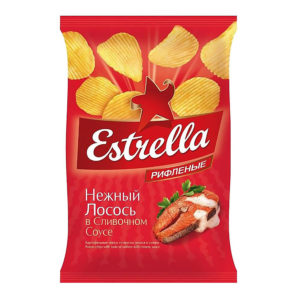
The child's body is not fully formed, therefore, it especially needs to receive the necessary useful trace elements and vitamins. Chips are a health hazard because they have the ability to signal food intake and superficial saturation to the brain, which slows down full development.
According to statistics, adolescents are addicted to harmful "snacks", that is, children who have their own pocket money, which they spend on "snacks", choosing their own purchases.
The daily calorie intake for a 10-year-old child is about 2 thousand kcal with moderate activity. One hundred grams of the product contains about 500 kcal, and with simple calculations it turns out that this is ¼ of the daily diet. However, it should be borne in mind that teenagers rarely stop at one serving. It is this mechanism of action that causes the main damage, without taking into account the analysis of the harmful composition.
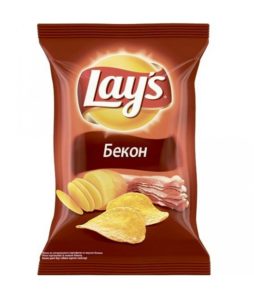
Can you eat chips during pregnancy and breastfeeding?
Pregnancy is a special condition of the female body, when women become extremely careful when choosing food according to its properties, doubting and analyzing the benefits and harms of all the dishes they eat. Pregnant women change their taste preferences due to changes at the hormonal level, so they can eat what they did not like before.
Questions arise about the dangers of potato chips during pregnancy. You don't need to abuse this dish, but you can afford what you want. After consumption, there is a possibility of heartburn. This unpleasant symptom is familiar to many pregnant women. High salt content leads to edema. This is what pregnant women try to avoid throughout the entire period of gestation. Therefore, before feasting on snacks, you should carefully read the composition and properties of the delicacy, think about the consequences or consult your doctor.
If a woman is breastfeeding, then this means a high level of responsibility.What the mother eats is sure to be received by the baby with breastfeeding. Therefore, it is so important to have healthy foods in the diet. Chips are contraindicated for a nursing mother. The use of harmful flavors, high salt content and hot seasonings threatens the baby:
- bloating;
- colic;
- diarrhea;
- restless sleep;
- loss of appetite.
For whom are chips contraindicated?
Chips should not be consumed by those who:
- overweight problems (due to the high calorie content of the snack);
- diseases of the digestive system of acute and chronic forms (due to the content of substances harmful to the stomach);
- kidney disease (high salt content tends to incorrectly remove fluid from the body);
- allergic manifestations (due to the content of additives, dyes);
- small children (due to the immature intestinal environment, the intake of artificial additives threatens to harm the development and health of the child's body).
Is there a benefit to chips?
The benefits of chips may seem like a mythical phrase to many, but they exist. We are talking about that appetizer that is healthy in its properties, which is prepared from root crops in compliance with all technical and nutritional requirements.
How to make homemade chips?
Delicious and healthy homemade chips are made from a potato variety that has a high dry matter content: this property is useful when drying.
Recipe:
- 0.5 kg of potatoes;
- 5 tbsp. l. olive or refined vegetable oil;
- seasonings to taste.
Rinse the root vegetable, cut into thin slices, dry for 30 minutes, salt, pepper, release into hot oil, fry until golden brown. Home cooking is a useful replacement for chips from a bag, because you can independently control the quality of products, the amount of salt and pepper.
Chips in the oven
Baking is a very healthy cooking method that will help preserve the most valuable properties of the product and will suit everyone.
Pumpkin Chips
- 200 g pumpkin;
- 3 tbsp. l. extra virgin olive oil, nutmeg, salt, pepper.
A vegetable cutter is suitable for cutting pumpkin slices: with its help, the pieces are obtained of the required thickness. They are dipped in a mixture of spices, placed on a baking sheet covered with baking paper, sprinkled with fat and baked. The degree of doneness is determined by the fact that the edges of the thin slices begin to rise above the level of the baking sheet and bend up. Such slices with useful properties can even be included in the children's menu, but only after consulting a pediatrician.
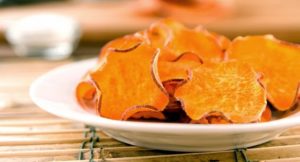
Chips in the microwave
Chips cook faster in the microwave, however, this method of processing can reduce the beneficial properties of the dish.
Apple
- apples - 2 - 3 pieces;
- citric acid, sugar, water.
The apples are cut thinly, boiled in sugar syrup for 5 minutes, sent to the microwave for 7 minutes until crisp. The benefit of this snack is that you can use it as a snack between meals.
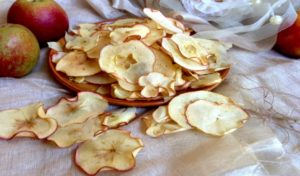
How to choose less harmful chips
A formulation that will satisfy any nutritionist or nutritionist includes no harmful additives. Avoid:
- monosodium glutamate;
- corn starch;
- dyes.
Conclusion
The benefits and harms of chips have been a topic of discussion for many years. The leaders in the production of this snack are not going to change their approach and continue to experiment with the composition, properties, inventing various flavors.Consumers choose on their own whether a product from a beautiful bag or a healthy slice prepared on their own from a natural root vegetable suits them.

